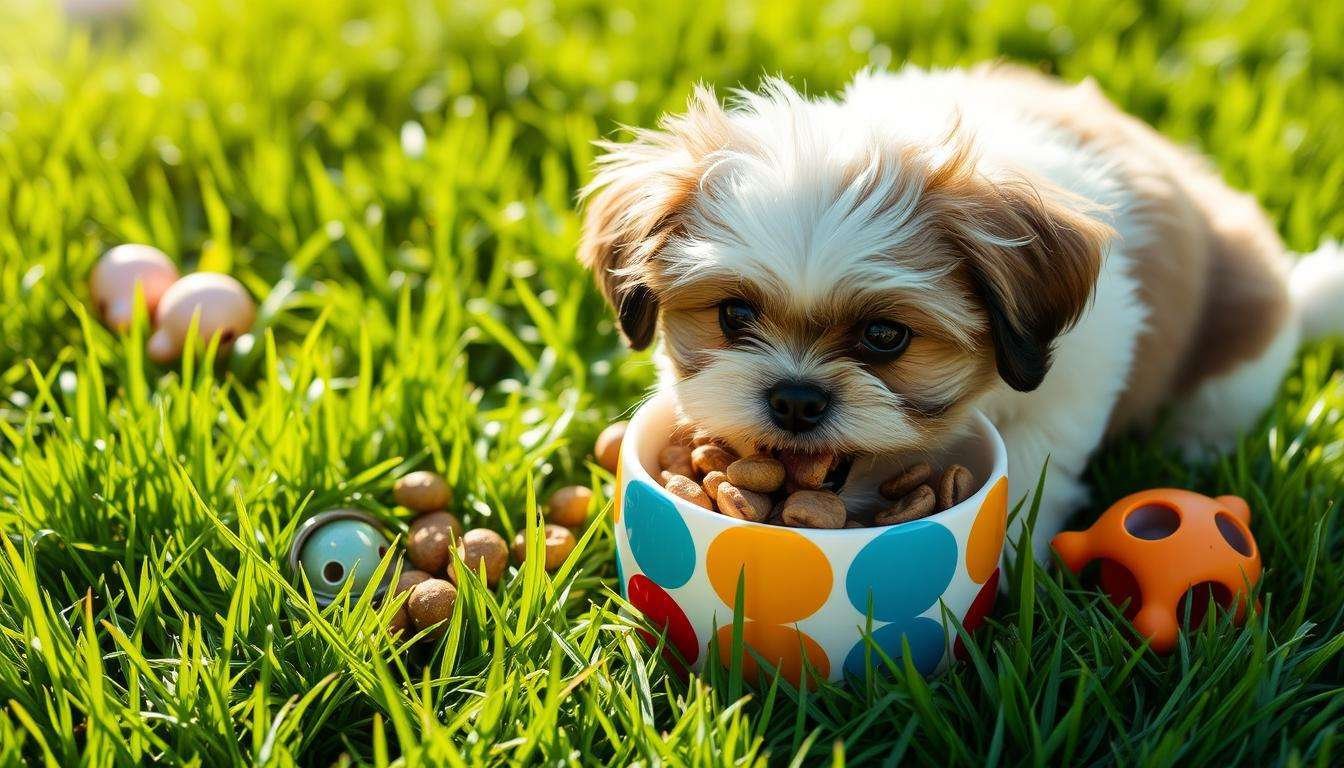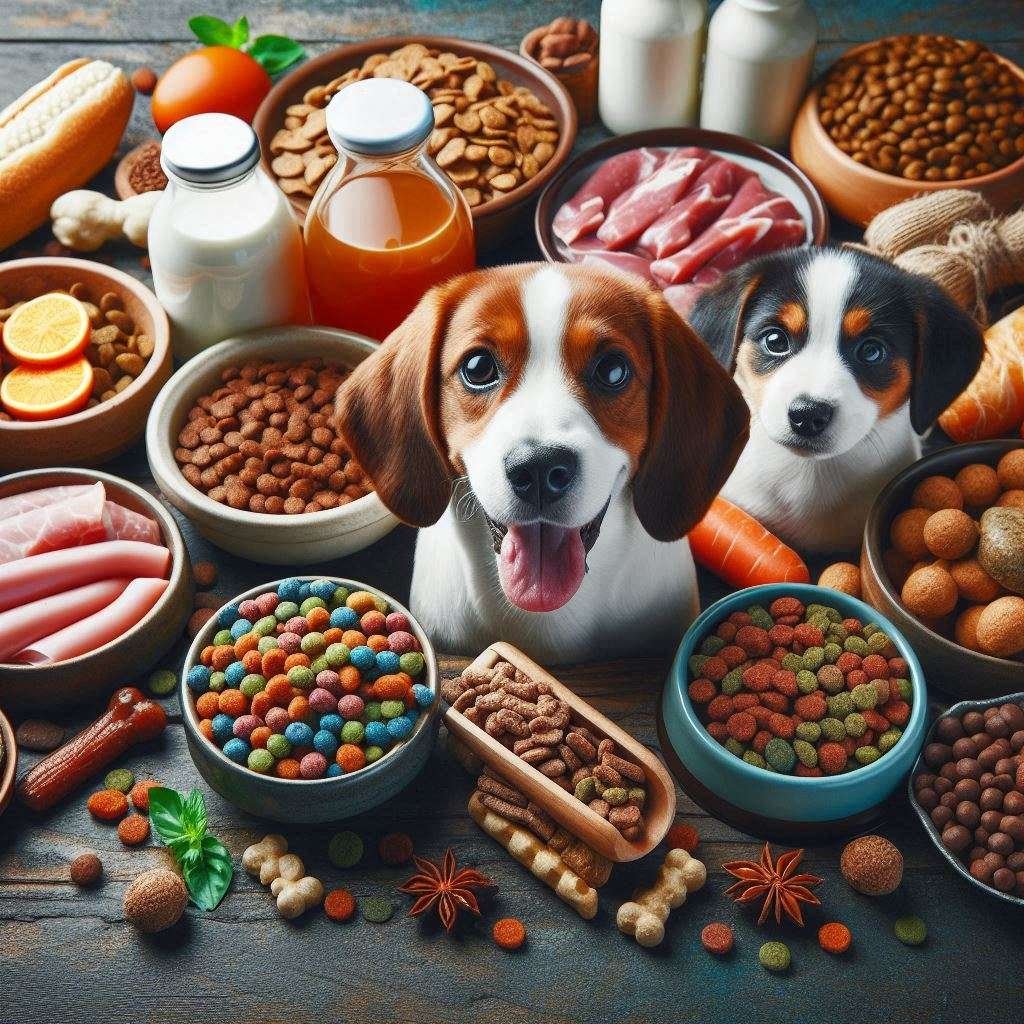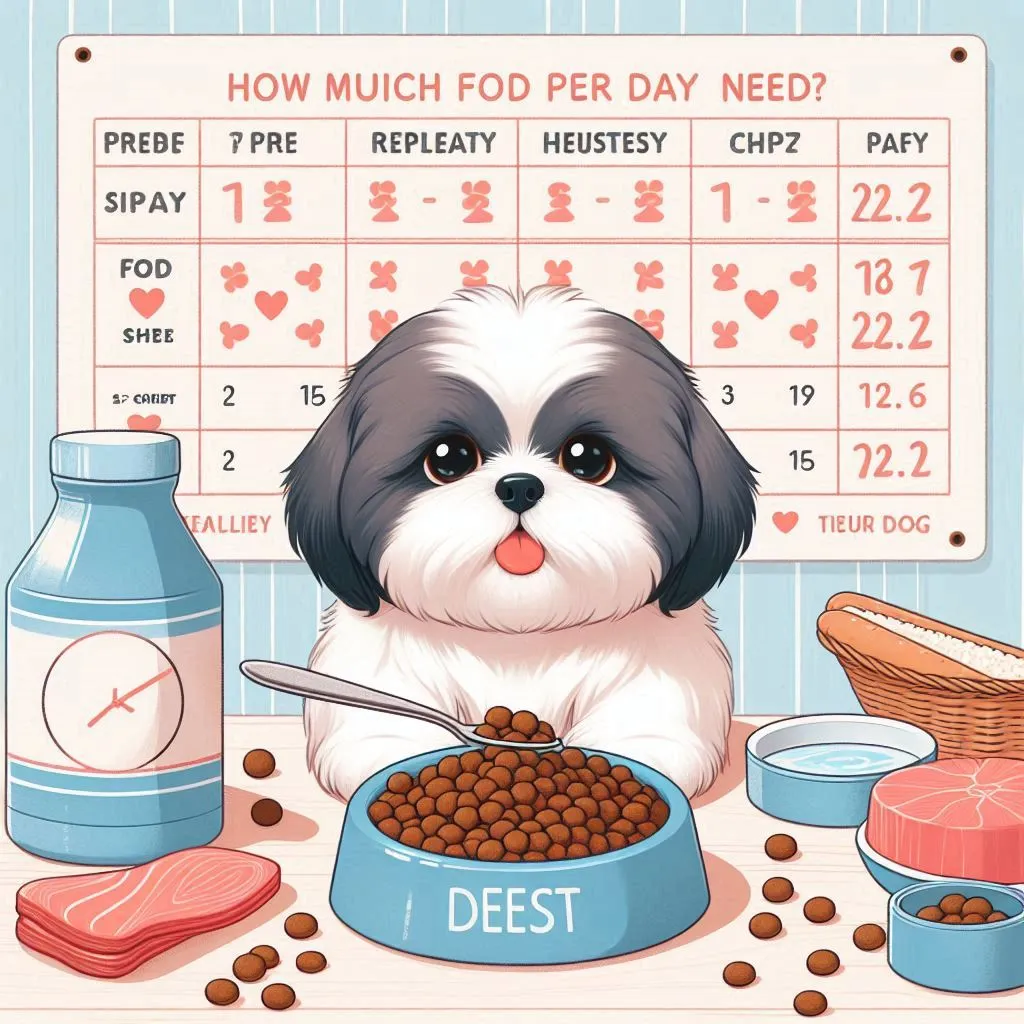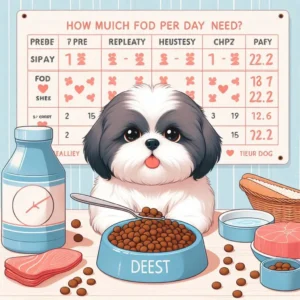what the Best Puppy food for a shih tzu
Finding the right food for Shih Tzu puppies can be a challenge. As a small breed dog owner, I understand how crucial nutrition is for these cute dogs. Shih Tzus have special dietary needs that need careful thought when picking their food.
It’s vital to feed them small breed dog food made for puppies. These little dogs need meals packed with nutrients to keep up with their energy and fast metabolism. To find the best food for your Shih Tzu puppy, you must know their nutritional needs and look at different options available.
In this guide, we’ll look at the Best Puppy food for a shih tzu. We’ll cover the key nutrients they need and how to pick the right diet for your puppy’s health and growth. Let’s start this journey to make sure your Shih Tzu puppy gets off to a great start!
Key Takeaways
- Shih Tzu puppies need nutrient-rich small breed dog food
- Good nutrition is key for their growth and development
- High-quality protein is important for Shih Tzu puppies
- Look for foods with the right amount of calcium and phosphorus
- Consider both wet and dry food for your Shih Tzu puppy
- Pick reputable brands that focus on small breed puppies
- Talk to a vet for advice on what’s best for your puppy
Understanding Shih Tzu Puppies’ Nutritional Needs
Shih Tzu puppies need special nutrition for their growth and health. They are small dogs with high energy and grow fast. It’s important to feed them the right kind of food.
Protein requirements for growing Shih Tzu puppies
Protein is key for building muscles and helping them grow. Look for puppy food with chicken, lamb, or fish as main proteins. Foods with at least 22% protein are best for them.
Essential fatty acids for coat health
Shih Tzus have beautiful coats that need the right food to stay healthy. Omega-3 and omega-6 fatty acids keep their skin and coat in top shape. These should come from fish oil or flaxseed in their food.
Calcium and phosphorus balance for proper bone development
Getting the right amount of calcium and phosphorus is important for strong bones and teeth. Small breed puppy food should have a 1.2:1 calcium to phosphorus ratio. This helps prevent bone problems and supports healthy growth.
When picking food for your Shih Tzu puppy, choose foods made for small breeds. These foods are tailored to their needs and help them grow right. Always talk to your vet to make sure you’re feeding your puppy the best diet.
Key Ingredients to Look for in Shih Tzu Puppy Food
When picking food for your Shih Tzu puppy, I focus on quality ingredients. Top brands include these key elements for your puppy’s growth and health.
Lean protein is a must. Look for chicken, lamb, or fish first. These help build strong muscles and keep your puppy healthy. Healthy fats like omega-3 and omega-6 are also key for a shiny coat and a sharp mind.
Carbs from easy-to-digest sources like sweet potatoes or brown rice give energy and fiber. Fruits and veggies add vitamins and minerals. Look for foods with pumpkin, blueberries, and spinach for extra nutrition.
Probiotics and prebiotics are important for gut health, crucial for small breeds. Ingredients like chicory root or dried fermentation products support this.
“A balanced diet with high-quality ingredients is the foundation for your Shih Tzu puppy’s health and longevity.”
Stay away from foods with artificial preservatives, colors, or flavors. Choose foods with natural preservatives like mixed tocopherols instead. With these ingredients, you’re giving your Shih Tzu a great start in life.
Dry vs. Wet Food: Which is Better for Shih Tzu Puppies?
Choosing the right food for your Shih Tzu puppy can be tricky. I’ve looked into both dry and wet food options to help you pick the best for your furry friend.
Pros and cons of dry kibble
Dry puppy food is a top pick for small breeds like Shih Tzus. It’s easy to store, keeps teeth clean, and lasts a long time. But, it might be tough for little puppies to chew, and it lacks moisture.
| Pros | Cons |
|---|---|
| Convenient storage | Less moisture content |
| Helps clean teeth | Harder to chew for puppies |
| Longer shelf life | May contain more fillers |
Benefits of wet food for Shih Tzu puppies
Wet puppy food has more moisture, which is key for Shih Tzu puppies. It’s also easier to chew and tastes better. But, it goes bad faster and can be messy.
Combining dry and wet food options
Mixing dry and wet puppy food can be the best choice. This way, your Shih Tzu gets the right mix of nutrition, hydration, and dental care. Start with a little of each and adjust as needed based on your puppy’s likes and needs.
“A balanced diet of both dry and wet food can provide optimal nutrition for your Shih Tzu puppy, combining the benefits of both types.”
Top Brands of Puppy Food for Shih Tzus
Choosing the right food for your Shih Tzu puppy is key. I’ve found the best options for their special needs. These foods are packed with quality ingredients for your puppy’s health.
Royal Canin Shih Tzu Puppy Food is a top pick. It has ingredients that help with healthy skin and coat. The kibble size is just right for their small mouths, aiding in chewing and digestion.
Hill’s Science Diet Small Paws for Puppies is another great choice. It has DHA from fish oil for brain and eye health. Plus, it has minerals for strong bones and antioxidants for a strong immune system.
For those looking at grain-free options, Wellness CORE Natural Grain Free Dry Dog Food for Small Breed Puppies is a good pick. It’s full of premium protein and probiotics for your puppy’s gut health.
| Brand | Key Ingredients | Special Features |
|---|---|---|
| Royal Canin Shih Tzu Puppy | Chicken by-product meal, brown rice, corn | Breed-specific formula, tailored kibble size |
| Hill’s Science Diet Small Paws | Chicken meal, whole grain wheat, cracked pearled barley | DHA for brain development, balanced minerals |
| Wellness CORE Natural Grain Free | Deboned turkey, turkey meal, chicken meal | Grain-free, probiotics for digestion |
While these brands are great, always talk to your vet. They can help pick the best food for your Shih Tzu puppy’s needs.
Grain-Free Options: Are They Necessary for Shih Tzu Puppies?
Grain-free puppy food is a big topic in pet care. If you have a Shih Tzu puppy, you might be thinking about it. Let’s look into grain-free diets and how they affect Shih Tzu puppies.
Understanding the Grain-Free Trend
The grain-free trend comes from the idea that dogs are related to wolves. So, they should eat like their wild ancestors. Grain-free puppy food uses things like potatoes, peas, or lentils instead of grains.
Potential Benefits and Risks
Some owners say grain-free diets help with coat health and digestion in Shih Tzu puppies. But, not all grain-free foods are the same. The quality of ingredients and how balanced the food is are key to good puppy nutrition.
| Benefits | Risks |
|---|---|
| Improved coat health | Potential nutrient deficiencies |
| Better digestion | Higher cost |
| Weight management | Possible link to heart issues |
Veterinarian Recommendations
Many vets warn against grain-free diets for Shih Tzu puppies unless really needed. They stress the need for balanced nutrition over following trends. If you’re thinking about grain-free food, talk to your vet to make sure it’s right for your puppy.
“Grain-free diets aren’t necessary for most Shih Tzu puppies. Focus on high-quality, balanced nutrition tailored to your puppy’s specific needs.”
Feeding Schedule and Portion Control for Shih Tzu Puppies
Feeding Shih Tzu puppies needs careful planning. They need the right balance of nutrients for healthy growth. I’ll share my insights on creating an effective feeding schedule and managing portions for your furry friend.

Shih Tzu puppies do well with a consistent feeding routine. I recommend dividing their daily food into three to four meals. This keeps their blood sugar stable and prevents overeating. As they get older, you can start giving them two meals a day.
It’s important to control how much you feed Shih Tzu puppies. Overfeeding can make them obese, which is a big problem for small breed dogs. Use a measuring cup to make sure you’re giving the right amount. The right amount depends on their age, weight, and how active they are.
| Age (months) | Daily Feeding Amount (cups) | Meals per Day |
|---|---|---|
| 2-3 | 1/2 – 3/4 | 4 |
| 4-6 | 3/4 – 1 | 3 |
| 7-12 | 1 – 1 1/4 | 2-3 |
When picking food for your Shih Tzu puppy, choose high-quality options that fit their nutritional needs. Always talk to your vet to make a feeding plan that’s right for your puppy. Remember, good nutrition is key for a healthy adult dog.
What’s the Best Puppy Food for a Shih Tzu: Our Top Picks
I’ve looked into many premium puppy food brands for Shih Tzu puppies. These brands are great for their specific needs. They help with healthy growth and development.
Royal Canin Shih Tzu Puppy is my top pick. It’s made just for their unique needs. It helps with their face and coat health. Plus, the kibble is easy for them to chew and digest.
Hill’s Science Diet Small Paws is also a great choice. It has DHA from fish oil for brain and eye health. This is key for Shih Tzu puppies. It also has minerals for strong bones and teeth, important for this breed.
| Brand | Key Benefits | Protein Source |
|---|---|---|
| Royal Canin Shih Tzu Puppy | Breed-specific formula, supports coat health | Chicken by-product meal |
| Hill’s Science Diet Small Paws | Supports brain development, promotes dental health | Chicken meal |
| Purina Pro Plan Small Breed Puppy | High protein content, supports immune system | Chicken |
Purina Pro Plan Small Breed Puppy is another top choice. It has lots of protein for muscle growth. Plus, it has probiotics for better digestion. These brands give your Shih Tzu puppy the best nutrition for growing well.
Addressing Common Dietary Concerns in Shih Tzu Puppies
Shih Tzu puppies need special care when it comes to food. I’ll talk about common diet issues and how to fix them with the right food choices.
Food allergies and sensitivities
Shih Tzu puppies might react to some foods. Common culprits include beef, chicken, dairy, and wheat. If your puppy scratches, has stomach problems, or ear infections, talk to your vet. They might suggest a special food that’s easier on their system.
Preventing obesity in Shih Tzu puppies
Shih Tzu puppies can easily get overweight. To keep them at a healthy size, measure their food and don’t overfeed. Pick a puppy food made for small breeds. It should have the right amount of calories and nutrients.
Dental health considerations
Shih Tzu puppies often have dental problems because of their small mouths and crowded teeth. Choose dry kibble for small breeds to help fight tartar. Some foods even have ingredients that help keep teeth clean while your puppy chews.
| Dietary Concern | Solution |
|---|---|
| Food allergies | Limited ingredient or hypoallergenic food |
| Obesity risk | Portion control and small breed-specific food |
| Dental health | Dry kibble with dental-friendly ingredients |
By picking the right food and feeding habits, you can help your Shih Tzu puppy stay healthy as they grow.
Transitioning Your Shih Tzu Puppy to Adult Dog Food
As your Shih Tzu puppy grows, their nutritional needs change. It’s key to switch from puppy food to adult food at around 10 to 12 months old for small breeds. This change is vital for their growth.
Switching food should be done slowly. Start with 75% puppy food and 25% adult food. Gradually increase the adult food over a week. This helps avoid stomach problems.
Choose adult food for small breeds that keeps up the high protein your puppy needs. The right food supports their coat and energy as they grow.
“A smooth transition to adult food sets the foundation for your Shih Tzu’s lifelong health and vitality.”
Watch your dog’s weight and energy during the switch. If you see any changes, talk to your vet. This ensures the new diet is right for your Shih Tzu.
| Day | Puppy Food | Adult Food |
|---|---|---|
| 1-2 | 75% | 25% |
| 3-4 | 50% | 50% |
| 5-6 | 25% | 75% |
| 7+ | 0% | 100% |
Homemade vs. Commercial Puppy Food for Shih Tzus
Choosing between homemade and commercial puppy food for Shih Tzus is a big decision. Both have their good points for puppy nutrition. I’ve looked into these options to help you pick the best for your pet.
Commercial small breed dog food is easy to use and well-balanced. Experts make these products to fit the needs of growing puppies. They have the right mix of quality ingredients for your Shih Tzu’s health.
Homemade puppy food lets you pick the ingredients yourself. You can use fresh, top-quality items that your pup likes. But, it takes a lot of planning to make sure it’s healthy.
| Aspect | Commercial Food | Homemade Food |
|---|---|---|
| Convenience | High | Low |
| Nutritional Balance | Guaranteed | Requires expertise |
| Ingredient Control | Limited | Full |
| Cost | Moderate | Varies |
| Time Investment | Low | High |
The best choice depends on your lifestyle and your Shih Tzu’s needs. Talking to a vet can help you pick the right option for your puppy’s diet.
Supplements: Do Shih Tzu Puppies Need Them?
Many pet owners ask if Shih Tzu puppies need supplements. Usually, a good small breed dog food gives them all the nutrients they need. But, there are times when supplements are helpful.
Shih Tzu puppies usually don’t need extra supplements if they eat a balanced diet. Their small bodies can get everything they need from the right puppy food. But, some situations might require supplements.
Let’s explore common supplements and their benefits for Shih Tzu puppies:
| Supplement | Potential Benefit | When to Consider |
|---|---|---|
| Omega-3 Fatty Acids | Coat health, joint support | Dry skin, dull coat |
| Probiotics | Digestive health | After antibiotics, digestive issues |
| Glucosamine | Joint health | Family history of joint problems |
| Multivitamins | Overall health | Homemade diets, picky eaters |
Always talk to a vet before giving your Shih Tzu puppy supplements. They can check what your puppy needs and suggest supplements if needed. But, remember, too many supplements can be bad, so always listen to your vet.
“The best approach to Shih Tzu puppy nutrition is a balanced, high-quality diet tailored for small breed puppies. Supplements should only be used when specifically recommended by a veterinarian.”
How to Read and Interpret Dog Food Labels
Reading dog food labels can be tricky. I’ll guide you through understanding ingredient lists, decoding nutritional guarantees, and recognizing quality indicators. This knowledge will help you choose the best food for your Shih Tzu puppy.
Understanding Ingredient Lists
Ingredient lists on dog food labels are ordered by weight. Quality dog food ingredients should be listed first. Look for named meat sources like chicken or beef as the top ingredient. Premium puppy food brands often use high-quality protein sources.
Decoding Nutritional Guarantees
Nutritional guarantees provide information about the minimum and maximum levels of nutrients. Pay attention to protein, fat, fiber, and moisture content. For Shih Tzu puppies, aim for foods with higher protein and moderate fat levels.
| Nutrient | Recommended Level |
|---|---|
| Protein | 22-32% |
| Fat | 8-15% |
| Fiber | 3-5% |
| Moisture | 10-12% |
Recognizing Quality Indicators on Labels
Look for AAFCO statements indicating the food is complete and balanced for puppies. Premium puppy food brands often include added vitamins, minerals, and omega fatty acids. Avoid foods with artificial preservatives, colors, or flavors.

By understanding these label components, you can make informed decisions about your Shih Tzu puppy’s nutrition. Remember, quality ingredients and balanced nutrition are key to supporting your puppy’s growth and development.
Conclusion
Choosing the right food for a Shih Tzu puppy is key to their health and growth. This article covered various aspects of their nutrition, like protein needs and feeding schedules. The right diet affects their energy, coat health, and overall well-being.
When selecting food for Shih Tzus, focus on high-quality proteins, essential fatty acids, and balanced calcium and phosphorus. These nutrients are vital for their health as a small breed. Each Shih Tzu puppy is different, so watch how they react to different foods.
The best puppy food for a Shih Tzu should meet their nutritional needs, fit your budget, and keep them happy and healthy. By understanding labels, considering both wet and dry options, and getting advice from your vet, you can make a smart choice. Your Shih Tzu puppy’s health journey begins with the food they eat.
FAQ
What are the specific nutritional needs of Shih Tzu puppies?
Shih Tzu puppies need a diet rich in quality protein for growth. They also need essential fatty acids for a shiny coat. Plus, they require a balanced mix of calcium and phosphorus for strong bones. Their small size means they burn more energy per pound than bigger dogs.
What key ingredients should I look for in Shih Tzu puppy food?
Look for puppy food with lean protein sources like chicken or fish. It should also have healthy fats from fish oil or flaxseed. And, it should have complex carbs from whole grains or veggies. Make sure to avoid byproducts, artificial preservatives, and fillers.
Is dry or wet food better for Shih Tzu puppies?
Both dry kibble and wet canned food work well for Shih Tzu puppies. Dry food is easy to use and helps keep their teeth clean. Wet food tastes better and adds extra moisture. Mixing both types can create a well-rounded diet.
Are grain-free diets necessary for Shih Tzu puppies?
Grain-free diets aren’t a must for Shih Tzu puppies unless they have a grain allergy or sensitivity. Yet, some owners choose grain-free food for other reasons. Always talk to your vet to see if grain-free is right for your puppy.
What are some top brands of puppy food for Shih Tzus?
Great puppy food brands for Shih Tzus include Wellness Core, Blue Buffalo Life Protection, Merrick Lil’ Plates, and Orijen Puppy. These brands offer high-quality, breed-specific formulas with the best ingredients.
How do I transition my Shih Tzu puppy to adult dog food?
Switch your Shih Tzu puppy to adult dog food over 7-10 days by mixing in more of the new food with their current puppy food. This slow change helps prevent stomach upset and lets their body get used to the new diet.
Should I consider homemade or commercial puppy food for my Shih Tzu?
Homemade and commercial puppy foods both have their good points. Homemade diets let you control what goes into your dog’s food but need careful planning and cooking. Commercial foods are easy but might have additives or fillers. Think about your lifestyle and get advice from a vet or nutritionist.















Post Comment